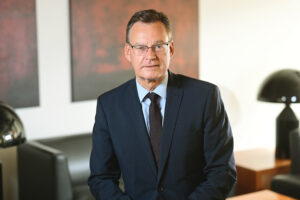
After more than 40 years of operation, DTVE is closing its doors and our website will no longer be updated daily. Thank you for all of your support.
Battle for fibre connectivity in Germany heats up
The battle for fibre connectivity in Germany is heating up with the announcement of two outline agreements between the country’s leading housing organisation and Vodafone and Tele Columbus and the separate announcement by Deutsche Telekom that it has achieved the milestone of seven million fibre homes passed.

Axel Gedaschko (Source: GdW)
The Federal Association of German Housing and Real Estate Companies (GdW) has struck an agreement with Vodafone and its fibre JV with Altice, OXG, to accelerate the build out of FTTH connections to two million homes. The initial agreement (like a similar one with Tele Columbus) takes the form of a ‘joint position paper’ setting out guidelines for the expansion of fibre in member housing associations’ properties.
OXG will build out fibre and take care of operations and maintenance of the infrastructure. The network will be open to all market participants, enabling tenants to decide which provider to choose. However, Vodafone will initially be responsible for marketing connections and providing internet, TV and phone services.
Vodafone and OXG will follow up by presenting model regulations to the GdW that will apply to all its member companies.
Each building in the expansion area will be connected with its own fibre. Within the building, each residential unit and a technical room will also have their own fibre connection with four fibers for IP-based broadband services. In addition, the infrastructure will be generally available to housing companies free of charge for additional services such as the transmission of smart metering data on energy consumption. Tenants who currently use a Vodafone cable connection can – but do not have to – switch to fibre.
The GdW/Tele Columbus agreement applies to three million homes and is similar in outline to the Vodafone one. In addition to the new fiber optic infrastructure, the existing coaxial network can continue to be used for television reception, so that nothing changes for the tenants when it comes to TV usage.
As with the Vodafone deal, the Tele Columbus position paper provides for negotiations between GdW and Tele Columbus on further model regulations. Contents include additional details and alternative models for setting up and operating fibre optic networks.
Axel Gedaschko, president of the GdW, said that “the fibre optic expansion in Germany can only be successful if network operators understand the diversity and individual requirements of the housing industry and tailor their contracts, technology and communication to them”.
He said that “the model contracts currently being developed by GdW and Vodafone are a success for the housing industry and its tenants”, while the regulations developed with Tele Columbus “provide housing companies with additional options, a high level of flexibility and legal certainty”.
Deutsche Telekom meanwhile says it has passed 7.1 million homes with fibre to date, up by 250,000 in October.


